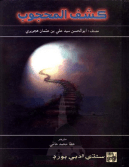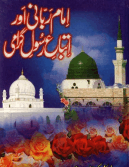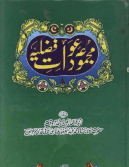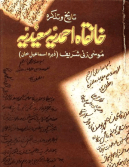Search results for: 2005
منبعِ انوار، اردو
منبعِ انوار، اردو
حالات و واقعات حضرت میاں شیر محمد شرقپوری نقشبندی مجددی
ترتیب: صاحبزادہ میاں جلیل احمد شرقپوری
Manba-e-Anwar, Urdu. By Sahibzada Jaleel Ahmad Sharaqpuri. Biograhical articles on the life of Miyan Sher Muhammad Sharaqpuri Naqshbandi Mujaddidi, a famous Sufi master of Punjab.
فضائل رمضان، اردو
فضائل رمضان، اردو، از عالم فقری
رمضان المبارک کے فضائل و مسائل پر مکمل کتاب
Fazail-e-Ramzan, Urdu, by Ālam Faqri. A complete book on the virtues and issues of Ramadān.
ڪشف المحجوب، سنڌي ترجمو

Imam Rabbani aor Ittaba-e-Rasool-e-Girami - Urdu

Majmooa Da'awat-e-Fazalia (Urdu): a book of prayers

Tareekh wa Tazkirah Khanqah-i Ahmadia Saeedia Musa Zai Sharif – Urdu

Tazkirah Qutb-e-Alam Hazrat Khwaja Abul Hasan Kharaqani – Urdu

English Translation of Selected Verses of the Holy Quran by Martin Lings
The renowned scholar and Sufi master, the late Dr Martin Lings (Shaykh Abu Bakr Siraj ad-Din) was working on a full translation of the Qur’an when he passed away last year. His translations of verses from the Qur’an were extracted from these previously unpublished writings, and from all his other publications, both books and articles. Among the translations are the all-important first chapter of the Qur’an (al-Fatihah); the Verse of Light (Ayat al-Nur); verses from the Chapter entitled Ya Sin which is regarded as ‘the heart of the Qur’an’; numerous verses from seventy-six other Chapters; and full translations of nine of the short Chapters at the end of the Qur’an including the often-repeated last three Chapters. Occasionally, Dr Lings translated a particular verse in more than one way; all the different versions have been retained. On the one hand, this is a reflection of the fact that there can never be a definitive translation of the sacred text; and, on the other hand, this brings out the multiple meanings that may exist in one verse. In addition, there is an appendix of Dr Lings’ translation of the Ninety-nine Beautiful Names of God with the original Arabic. The Holy Qur’an: Translations of Selected Verses is a short and accessible introduction to the Qur’an with the additional benefits of the profound learning of a best-selling author and the beautiful language of a published poet. This translation emphasises the spirituality at the heart of the Qur’an and its universal message; and, on a personal note, the choice of verses used by Dr Lings in his own daily prayers. Will be of interest to all those who wish to read the Qur’an, to non-Arabic speaking Muslims, to students of Arabic, to those working on translation from Arabic, and to all admirers of the writings of the late Dr Martin Lings.
About the Author
Dr. Martin Lings (Abu Bakr Siraj ad Din) passed away on 11 May 2005. He is best known for his English language biography of the Prophet Muhammad, Muhammad: His Life Based on the Earliest Sources.
He was born in Lancashire in 1909. He received his degree in English at Oxford in 1932, and became a Lecturer in Anglo-Saxon at the University of Kaunas. In 1939, he went to Egypt to study Islam and Arabic, and converted to Islam. The following year he was given a lectureship in Cairo University. He returned to the UK in 1952, and got a degree in Arabic from London University. He was a student and friend of C.S. Lewis, and in turn, became a teacher and friend to Le Gai Eaton.
From 1970-74 he was Keeper of Oriental Manuscripts and Printed Books at the British Museum where he had been in special charge of the Qur'an manuscripts, amongst other treasures, since 1955. Besides being a well respected biographer and a translator and author of texts about Sufism, Dr. Lings was a modern day authority on William Shakespeare. During Autumn 2004, he put forth his thesis that Shakespeare may have been influenced by Sufism.
(from www.altafsir.com)






